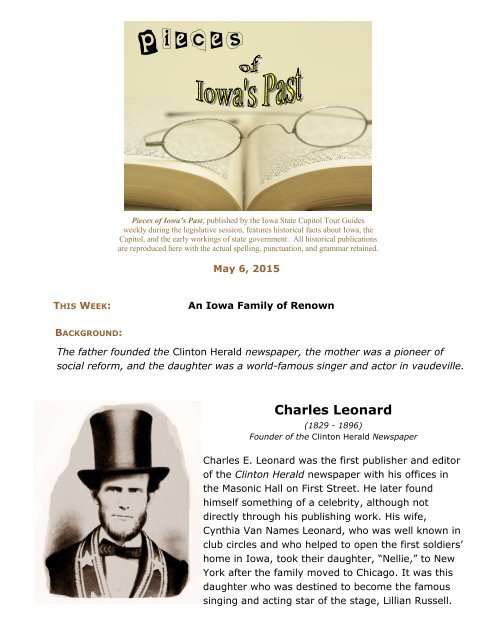663344
663344
663344
- No tags were found...
You also want an ePaper? Increase the reach of your titles
YUMPU automatically turns print PDFs into web optimized ePapers that Google loves.
piecesPieces of Iowa’s Past, published by the Iowa State Capitol Tour Guidesweekly during the legislative session, features historical facts about Iowa, theCapitol, and the early workings of state government. All historical publicationsare reproduced here with the actual spelling, punctuation, and grammar retained.May 6, 2015THIS WEEK:An Iowa Family of RenownBACKGROUND:The father founded the Clinton Herald newspaper, the mother was a pioneer ofsocial reform, and the daughter was a world-famous singer and actor in vaudeville.Charles Leonard(1829 - 1896)Founder of the Clinton Herald NewspaperCharles E. Leonard was the first publisher and editorof the Clinton Herald newspaper with his offices inthe Masonic Hall on First Street. He later foundhimself something of a celebrity, although notdirectly through his publishing work. His wife,Cynthia Van Names Leonard, who was well known inclub circles and who helped to open the first soldiers’home in Iowa, took their daughter, “Nellie,” to NewYork after the family moved to Chicago. It was thisdaughter who was destined to become the famoussinging and acting star of the stage, Lillian Russell.
Cynthia Leonard was a suffragist, aidWorker, and writer, notable for herpioneering efforts toward social reform inthe 19th Century. Born Cynthia Hicks VanName in Buffalo, New York, she marriedCharles E. Leonard in 1852. They hadeight children, the most famous of whomwas the entertainer Helen Louise Leonard(later known as Lillian Russell).Cynthia Leonard(1828 - 1908)Suffragist and AuthorWhile a young woman in Buffalo, Leonardbecame the first woman to stand behind acounter as a salesperson and laterbecame a member of Buffalo’s firstWoman’s Social and Literary Club. Fouryears after her marriage, in 1856, thecouple moved from Detroit, Michigan, toClinton, Iowa, where Charles Leonardfounded the Clinton Herald, that community’s newspaper, still in existence today.Cynthia was on the executive committee of the Soldiers’ Relief Association, whichestablished the first soldiers’ home in the State of Iowa.In 1863, Charles Leonard sold the Herald, and the couple moved to Chicago. ThereCynthia organized a fair to benefit the Freedman’s Aid Society, helped found the Chicagobranch of Sorosis and was its editor for a time, and was a member of the ChicagoPhilosophical Society. In 1869, she led the spiritualist faction of the women’s suffragemovement at the Music Hall, one of the first women’s suffrage meetings ever held inChicago. Susan B. Anthony was a frequent visitor in the Leonard home.Cynthia organized the Good Samaritan Society, and after the great Chicago fire, sheestablished a homeless shelter for the “unfortunate” women of the city. She wasinstrumental in the decision to place matrons in Chicago prisons, and she authored twonovels: Adventures of Lena Rouden, or the Rebel Spy and Fading Footprints, or the Lastof the Iroquois.
Lillian Russell(1861 - 1922)Renowned Stage Actress and SingerLillian Russell was born Helen Louise Leonard in Clinton, Iowa. Her father wasnewspaper publisher Charles E. Leonard, and her mother was author and feministCynthia Leonard, the first woman to run for mayor of New York City. Her familymoved to Chicago in 1865, where shestudied at the Convent of the SacredHeart from age seven to 15 and then atthe Park Institute. Her father became apartner in the printing firm of Knight &Leonard, and her mother becameactive in the women’s rightsmovement. Russell, called “Nellie” as achild, excelled at school theatricals. Inher teens, she studied music privatelyand sang in choirs.When Russell was 18, her parentsseparated, and she and her mothermoved to New York City.During the era of vaudeville, Russellplayed on Broadway and in countlesstheaters and halls.For many years, Russell was theforemost singer of operettas in America. Her voice, stage presence, and beautywere the subject of a great deal of fanfare in the news media, and she wasextremely popular with audiences. Famed movie actress Marie Dressler oncerecalled, “I can still recall the rush of pure awe that marked her entrance on thestage. And then the thunderous applause that swept from orchestra to gallery, tothe very roof.” When Alexander Graham Bell introduced long distance telephoneservice on May 8, 1890, Russell’s voice was the first carried over the line. FromNew York City, Russell sang “Sabre Song” to audiences in Boston and Washington,D.C. She rode a bicycle custom made for her by Tiffany & Co. It was a gold-platedmachine that displayed the jeweler’s art at its most opulent and unconventional—the handlebars inlaid with mother-of-pearl and the wheel spokes featuring herinitials set in diamonds. She had “a cream serge leg-of-mutton sleeve cycling suitwith the skirt shortened by three inches, which caused a sensation and set atrend.”
For 40 years, Russell was also the companion of famed businessman “Diamond Jim”Brady, who showered her with extravagant gifts of diamonds and gemstones andsupported her extravagant lifestyle.In March 1922, Russell traveled aboard the R.M.S. Aquitania from Southampton,England, to the Port of New York on theMarch 11 to March 17 crossing. Accordingto The New York Times, she “establisheda precedent by acting as chairman of theship’s concert, the first woman, so far asthe records show, to preside at an entertainmentonshipboard.”Russell died at her home in Pittsburgh,Pennsylvania, on June 6, 1922, shortlyafter completing a fact-finding mission toEurope on behalf of President WarrenHarding. The mission was to investigatethe increase in immigration. Sherecommended a five-year moratorium onimmigration, and her findings wereinstrumental in the content of a 1924immigration law. She suffered apparentlyminor injuries on the return trip, which,however, led to complications, and shedied after ten days of illness.As with today’s celebrities, Lillian Russellallowed her name and likeness to be used inproduct promotion.Thousands of people lined the route ofRussell’s military funeral, attended bymany actors and politicians, and PresidentHarding sent a wreath that was set on topof her casket. She is interred in herfamily’s private mausoleum in the Allegheny Cemetery in Pittsburgh, Pennsylvania.A 1940 film was made about Russell, although it presents a sanitized version of her life. It was directedby Irving Cummings who, as a teenager starting his career, had acted with Russell in the play Wildfirein 1908. It stars Alice Faye, Henry Fonda, Don Ameche, Edward Arnold, and Warren William.The Lillian Russell Theatre aboard the City of Clinton Showboat is a summer stock theatre named afterRussell in her hometown of Clinton, Iowa. The University of Pittsburgh‘s student activities building, theWilliam Pitt Union, has a Lillian Russell Room on its fourth floor. In the offices of The Pitt News, in thesame location where Russell lived when the building was the Schenley Hotel, the room contains aportrait of Russell.
In 1913, Lillian Russell was shown in a tinted film clip for a few seconds.




